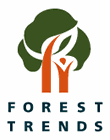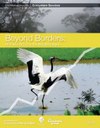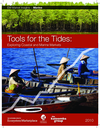Forest Trends

May 24-27, 2010, Puerto Maldonado, Madre de Dios, Peru - Payments for Ecosystem Services (PES) and REDD Course for Community Leaders was hosted by Forest Trends and partners, with support from the Moore Foundation, the United States Agency for International Development (USAID), the United Nations Development Program (UNDP), the Global Environmental Facility (GEF) and the Norwegian Agency for Development Co‐Operation (NORAD).
August 9-13, 2010, La Ceiba, Honduras - The workshop, entitled Regional Workshop on Compensation and Payments for Ecosystems Services (Taller Regional: Compensación y Pago por Servicios Ambientales), was hosted by Forest Trends, the Environmental Leadership andTraining Initiative (ELTI), EcoLogic Development Fund and the Rainforest Alliance, and was made possible by support from USAID through the TransLinks Cooperative Agreement.
June 23‐24, 2010, Hanoi, Vietnam - Workshop entitled "Katoomba XVII: Taking the Lead: Payments for Ecosystem Services in Southeast Asia" was hosted by Forest Trends, the Katoomba Group, Ministry of Agriculture and Rural Development (MARD), Ministry of Natural Resources and Environment (MONRE), United States Agency for International Development (USAID) and Winrock International, and was made possible by support from USAID through the TransLinks Cooperative Agreement.

An Ecosystem Marketplace Insight Series publication covering: Payments for Ecosystem Services-Scaling Up…and Down; State of the Forest Carbon Markets Asia; Round Peg, Square Hole-Forest Carbon under Existing Law in Southeast Asia; Oddar Meanchey-REDD in Cambodia; Participatory Forest Management; EM Cheat Sheet-What is a Social Impact Assessment?; Asian Governments Explore Ecosystem Markets for Environmental Protection; The State of Play in MRV and REDD; The Prospects for PES in Vietnam; The Potential of Biodiversity Offsets in Vietnam; China and PES-New Approaches for Environmental Forestry

Guide from Forest Trends outlining Payments for Ecosystem Services and creating a framework for developing forest carbon projects. In Spanish.

A manual compiled by Forest Trend and the Katoomba Group explaining what payments for ecosystem services (PES) are and how PES deals work in the marine environment. The primer is divided into 3 sections, the first reviews basic PES concepts, the second section details a step-by-step approach to developing Marine PES Deals and the third section outlines opportunities, risks and ideal conditions for poverty reduction.

Este documento fue diseñado para proporcionar un mayor conocimiento sobre lo que son los esquemas de Pago por Servicios Ambientales (PSA) y cómo funcionan este tipo de acuerdos en ecosistemas marinos. La publicación está dirigida a un público interesado en explorar el potencial de los esquemas de PSA - como vendedor, como organización trabajando directamente con comunidades costeras y como administradores de recursos marinos. Este documento debe ser leído antes de completar el diseño de un acuerdo de PSA, ya que brinda una guía sobre las condiciones en que un esquema de PSA puede ser de mayor relevancia y con mayores probabilidades de éxito, asimismo brinda información sobre posibles riesgos que deben ser considerados. También es importante que sea revisado en secuencia, ya que se retoman conceptos básicos, los cuales van a ser definidos en los primeros capítulos.

A manual produced by Forest Trends and the Katoomba Group to provide capacity building materials for specific audiences regarding payments for ecosystem services and environmental markets. This manual outlines training modules for specific audiences with subject matter and learning objectives specific to that audience; public sector, private sector, public and non-profit sector, and rural communities.

Ecosystem Marketplace Market Insight Booklet, compiled by Forest Trends and the Katoomba Group, describing the importance of financing the protection of valuable ecosystem services, specifically the role the ocean plays. The publication demonstrates the need to recognize the economic value of the ocean and combining marine biodiversity offsets with marine and coastal developments. hese articles were commissioned by Ecosystem Marketplace to serve as context and provide background for the Marine Katoomba Meeting, held in Palo Alto, California, on February 9–10, 2010.

Manual by Michael Richards, Katoomba Ecosystem Services Incubator, Forest Trends and Steve Panfil, Climate, Community and Biodiversity Alliance aimed at carbon offset project designers and implementers who are not specialists in monitoring and evaluation, to aid in realistically documenting the ways their projects affect the livelihoods of people living in and around their project site. The manual is designed to complement the CCB standards. This is the first version of the manual and it will be adjusted and improved after a period of field testing in 2010. This manual is the Spanish language version.

Forest Trends, CCBA, FFI, and Rainforest Alliance have published Version 1.0 of a “Manual for Social Impact Assessment of Land-Based Carbon Projects: Part II - Toolbox of Methods and Support Materials” The Manual is designed to be used by carbon project proponents aiming for validation under the CCB Standards, or other multiple-benefit carbon standards. The Manual introduces the three areas of the Toolbox, Area 1 Social Impact Assessment Framework, Area 2 Data Collection and Analysis Methods and Area 3 Support Materials. The Manual is Version 1.0, since the idea is to ‘field test’ it over the coming months and, based on user experience, peer review, and other feedback, bring out Version 2.0 in early 2011.

Forest Trends, CCBA, FFI, and Rainforest Alliance have published Version 1.0 of a “Manual for Social Impact Assessment of Land-Based Carbon Projects: Part II - Toolbox of Methods and Support Materials” The Manual is designed to be used by carbon project proponents aiming for validation under the CCB Standards, or other multiple-benefit carbon standards. The Manual introduces the three areas of the Toolbox, Area 1 Social Impact Assessment Framework, Area 2 Data Collection and Analysis Methods and Area 3 Support Materials. The Manual is Version 1.0, since the idea is to ‘field test’ it over the coming months and, based on user experience, peer review, and other feedback, bring out Version 2.0 in early 2011. This version of the Manual is in Spanish.

Ecosystem Marketplace Insight Booklet on Coastal and Marine PES Markets. Many of the articles in this Insight booklet were created for the Marine Katoomba event, which took place in Palo Alto, California in February of 2010. Additional pieces have specifically been contributed for Katoomba XVII in Hanoi, Vietnam, June 23-24 2010.

Supplementary material for Forest Trend's Payments for Ecosystem Services Training Modules and Resources. Paper written by John Costenbader (Ed.), International Union for Conservation of Nature (IUCN). This paper provides a detailed overview of regulatory design and implementation options specifically for a non-lawyer audience. This paper is based on the findings from four case studies (Brazil, Cameroon, Guyana and Papua New Guinea), each representing varying geographies, forest cover and deforestation rates and stages of REDD preparation. The study questions whether legal clarity is an essential component for successful national REDD programs.

Supplementary material by Thomas Greiber (Ed), IUCN and the Katoomba Group for Forest Trend's Payments for Ecosystem Services Training Modules and Resources. This paper serves as a diagnostic tool to better understand the necessary legal and institutional basis for water-related PES schemes. The paper provides a background of PES, understanding water-related ecosystem services, the importance of legal frameworks for PES, the scope and contect of PES-related legislation, understanding and realizing the importance of property rights for PES, enabling public and private institutions and their roles in PES and the importance of governance for watershed PES. This paper also includes reports from Brazil, Bolivia, Colombia and Peru.

Report by Johannes Ebeling and Sara Namirembe, Katoomba Incubator regarding the Budongo-Bugoma Landscape REDD+ Project feasibility assessment. This REDD+ Project aims to reduce deforestation and degradation and to promote regeneration of forests in the Budongo-Bugoma Landscape in Western Uganda. The project focuses on private and community forests in 3 districts (Hoima, Kibaale and Kyenjojo).

An assessment compiled by Forest Trends and Climate Focus aimed at strengthening national and project level capacity REDD+ in Ghana. The assessment reviews options for integrating subnational activities on REDD into the design of the national REDD+ plan in Ghana in a manner consistent with the emerging international REDD+ policy. The report describes the potential subnational approaches to REDD+ and technical arrangements for operationalizing these approaches, reviews REDD+ initiatives in Ghana and considers how they could benefit from international REDD+ incentives under the different subnational approaches, and researches specific aspects surrounding the implementation and development of subntational activities.

This report presents an analysis of the legal and policy framework for tree and forest carbon in Ghana in an effort to contribute to this process. It shows that the current legal and regulatory structure for forestry and lands in Ghana provides indications of how carbon rights and benefits might be managed and distributed. The report also argues that realizing the full ecological and economic potential of REDD+ will require meaningful legal reforms and innovative application of existing mechanisms so as to effectively address the real drivers of deforestation and ensure permanence in any REDD+ activities.

The Katoomba Ecosystem Services Incubator developed the tool ROSE (REDD Opportunities Scoping Exercise) in order to assess how and where to engage with REDD+ in a given country. The Ghana ROSE was one of three ROSE country case studies conducted in 2009 and provided the Katoomba Incubator a solid basis for strategic engagement with REDD+ in Ghana. This report highlights the first part of the ROSE methodology and the expert workshop, which was attended by 20 key informants from a range of sectors and backgrouns. The group came up with a set of criteria for prioritizing REDD+ "project types" and reviewed legal, institutional and policy barriers or challenges which would result in a boost for REDD+ in Ghana.


